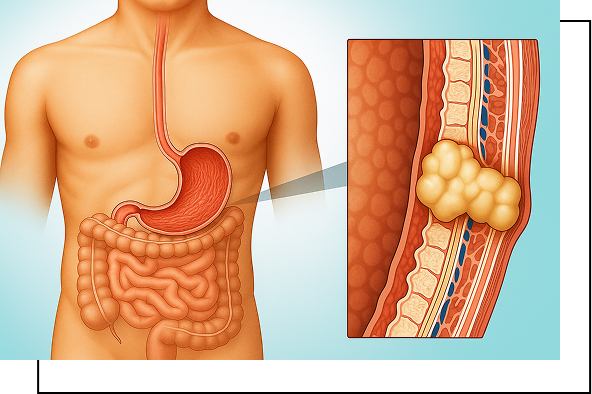Gastrointestinal Stromal Tumor treatment in Kolkata
Home > Stomach Diseases > Gastrointestinal Stromal Tumor
Overview
Gastrointestinal stromal tumors are rare cancers developing in the digestive tract’s connective tissues. They primarily occur in the stomach or the interstitial cells of Cajal, found in the walls of your digestive tract, but can appear anywhere in the gastrointestinal tract. Early detection and specialized care are essential for effective management. If you need guidance, consult Dr. Debjoy Sau, a well-reputed GIST cancer doctor in Kolkata, for personalized treatment options.

GIST Symptoms
Gastrointestinal stromal tumors can develop silently at first. However, as they grow, common symptoms may include:
Difficulty swallowing
Abdominal pain or discomfort
Feeling full quickly while eating or bloating
Unexplained weight loss
Visible blood in stool or black, tarry stools
Fatigue caused by anemia
Nausea and vomiting
Loss of appetite
Book An Appointment
Causes and Risk Factors
While the accurate reasons are unknown, Gastrointestinal stromal tumors are often linked to genetic mutations in KIT or PDGFRA genes. Risk factors include:
Age over 50
Family history
Certain genetic conditions
Neurofibromatosis type 1
Evaluation
Physical examination
Imaging tests: endoscopy, ultrasound, CT scan, or MRI scan
Genetic testing and biopsy
Blood work
Management
A proper stomach cancer diagnosis is vital for effective treatment. Doctors may prescribe:
Targeted drug therapy
Surgical removal
Regular monitoring
Personalized treatment plans
Follow-up care
Book An Appointment
FAQs
Know Your Answers
Can GIST be cured completely?
Surgical removal can cure localized GIST, but advanced cases require ongoing gastrointestinal stromal tumor treatment. Consult with a specialist in Kolkata for better health management plans.
Can GIST be treated with medication?
Yes, GIST can be treated with medication, particularly with targeted therapies. These medications target proteins involved in the growth and survival of GIST cells, shrink tumors, and control their growth.
How is GIST different from other stomach cancers?
GIST develops in specific digestive tract cells and responds differently to treatments compared to typical stomach cancers.
How often should I get follow-up scans?
Your doctor will determine the frequency based on individual risk factors, typically starting with more frequent checks (every 3-6 months) and gradually decreasing to annual scans.
What is the best treatment for stage 4 GIST?
Targeted drug therapy, often combined with surgery, offers the best chance for managing stage 4 GIST effectively, where the cancer has spread beyond the digestive tract.

